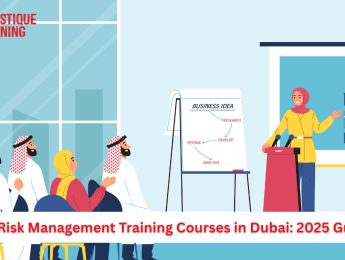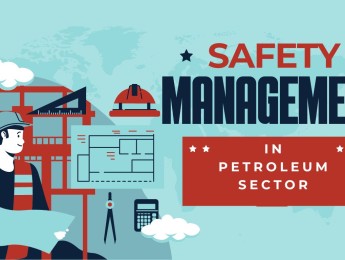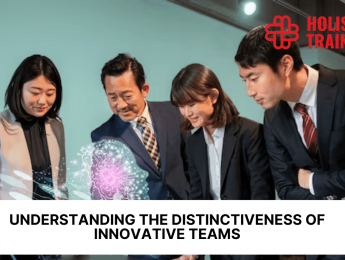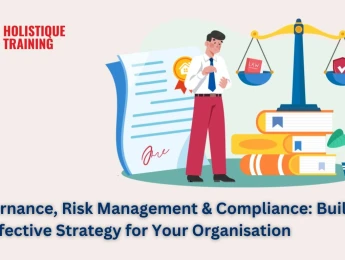- Table of Contents
- Introduction
- What Is Exhibition Management & Why Is It important?
- Showcasing Products and Services
- Networking Opportunities
- Brand Visibility and Recognition
- Market Research and Feedback
- Achieving Business Objectives
- What Are the Functions of Exhibition Management?
- Strategic Planning
- Venue Selection and Logistics
- Exhibitor and Sponsor Management
- Marketing and Promotion
- Visitor Engagement and Experience
- Planning Exhibition Tips
- 1. Define Clear Objectives
- 2. Know Your Target Audience
- 3. Create a Detailed Plan and Timeline
- 4. Collaborate with Exhibitors and Sponsors
- 5. Utilise Technology
- 6. Focus on Sustainability
- What Makes a Good Event Manager?
- Strong Organisational Skills
- Excellent Communication and Interpersonal Skills
- Attention to Detail
- Flexibility and Adaptability
- Problem-solving Skills
- The Future of Virtual Exhibitions
- The Rise of Virtual Reality (VR) and Augmented Reality (AR)
- Global Accessibility and Inclusivity
- Reduced Environmental Impact
- Enhanced Analytics and Data Collection
- The Fusion of Physical and Virtual
- Conclusion
Introduction
Exhibition management is a multifaceted discipline that encompasses the planning, coordination, and execution of exhibitions or trade shows. These events serve as vital platforms for businesses, industries, and organisations to showcase their products, services, and innovations. Effective exhibition management plays a pivotal role in ensuring the success of such events, leaving a lasting impression on attendees and achieving organisational objectives. In this blog post, we will explore the importance of exhibition management, delve into its key functions, provide valuable planning tips, and discuss the qualities that make a good event manager.
What Is Exhibition Management & Why Is It important?
Exhibition management stands as the masterstroke behind the captivating spectacle of exhibitions, orchestrating a harmonious blend of creativity, strategy, and meticulous planning. At its core, exhibition management encompasses the art and science of organising exhibitions and trade shows. These events, often grand in scale and significance, serve as vibrant platforms where businesses, industries, and organisations converge to display their innovations, products, and services to a discerning audience. Here’s why exhibition management is pivotal in the dynamic landscape of business interactions:
Showcasing Products and Services
Exhibitions unfold as visual symphonies of innovation, where businesses unveil their latest products and services in a meticulously crafted environment. Within this bustling marketplace, exhibition management ensures that these displays are not mere presentations but compelling narratives that captivate the senses. Each booth, strategically positioned and visually appealing, becomes a miniature universe, inviting attendees into the essence of a brand’s creativity. Through effective management, these displays are transformed into immersive experiences, leaving attendees awe-inspired and eager to explore.
Networking Opportunities
One of the fundamental roles of exhibitions lies in weaving networks of professional relationships. Industry professionals, potential clients, and stakeholders converge within the exhibition halls, forming a vibrant tapestry of collaboration and opportunity. For businesses, these events are more than just marketing endeavours; they are crucibles of partnerships. Exhibition management plays a pivotal role in fostering these connections. By curating networking events, business forums, and interactive sessions, managers create an environment where conversations flow naturally, ideas are exchanged, and partnerships are forged. These connections often extend beyond the confines of the event, resulting in collaborations and ventures that define the future of industries.
Brand Visibility and Recognition
In the competitive world of modern business, standing out is not just an advantage; it’s a necessity. Exhibitions offer a platform where brands can elevate their visibility and carve a niche in the minds of their audience. Here, exhibition management metamorphoses into a creative powerhouse. Managers delve deep into the essence of a brand, understanding its unique selling points, values, and aspirations. Armed with this knowledge, they craft visually compelling booths, incorporating innovative designs, immersive technologies, and strategic branding elements. Through creative signage, interactive displays, and engaging presentations, exhibition managers ensure that the brand not only catches the eye but also lingers in the memory, leaving attendees with a lasting impression.
Market Research and Feedback
Exhibitions are not just platforms for showcasing products but also goldmines of market insights. In the realm of exhibition management, data becomes a precious commodity. Managers facilitate avenues for market research, enabling businesses to gather real-time feedback from attendees. Surveys, interactive sessions, and feedback kiosks become conduits through which businesses gain profound insights into consumer preferences, trends, and expectations. This meticulously collected and analysed data forms the bedrock of strategic decision-making. It guides product development, refines marketing strategies, and positions businesses ahead of the curve, transforming exhibitions into hubs of market intelligence.
Achieving Business Objectives
Ultimately, exhibitions are not just grand events; they are instrumental in catalysing business objectives. Statistics show that a staggering 89% of business owners attributed their success in achieving key goals to their participation in exhibitions. These events are accelerators, propelling businesses towards diverse objectives such as lead generation, brand visibility, market expansion, and partnership building. Through effective exhibition management, businesses participate and actively thrive, leveraging these platforms to attain milestones that define their growth trajectory.
In essence, exhibition management transforms mere gatherings of businesses into immersive experiences. Managers breathe life into exhibitions through meticulous planning, creative finesse, and an acute understanding of market dynamics. These events, once static displays of products, metamorphose into dynamic spaces where innovation meets interaction, and opportunities abound. Therefore, the importance of exhibition management is not just in the flawless execution of events; it lies in the transformative power it holds, shaping industries, fostering connections, and propelling businesses towards unparalleled success.
What Are the Functions of Exhibition Management?
Effective exhibition management involves a range of functions that contribute to the smooth execution and success of an event. Let's explore some key functions:
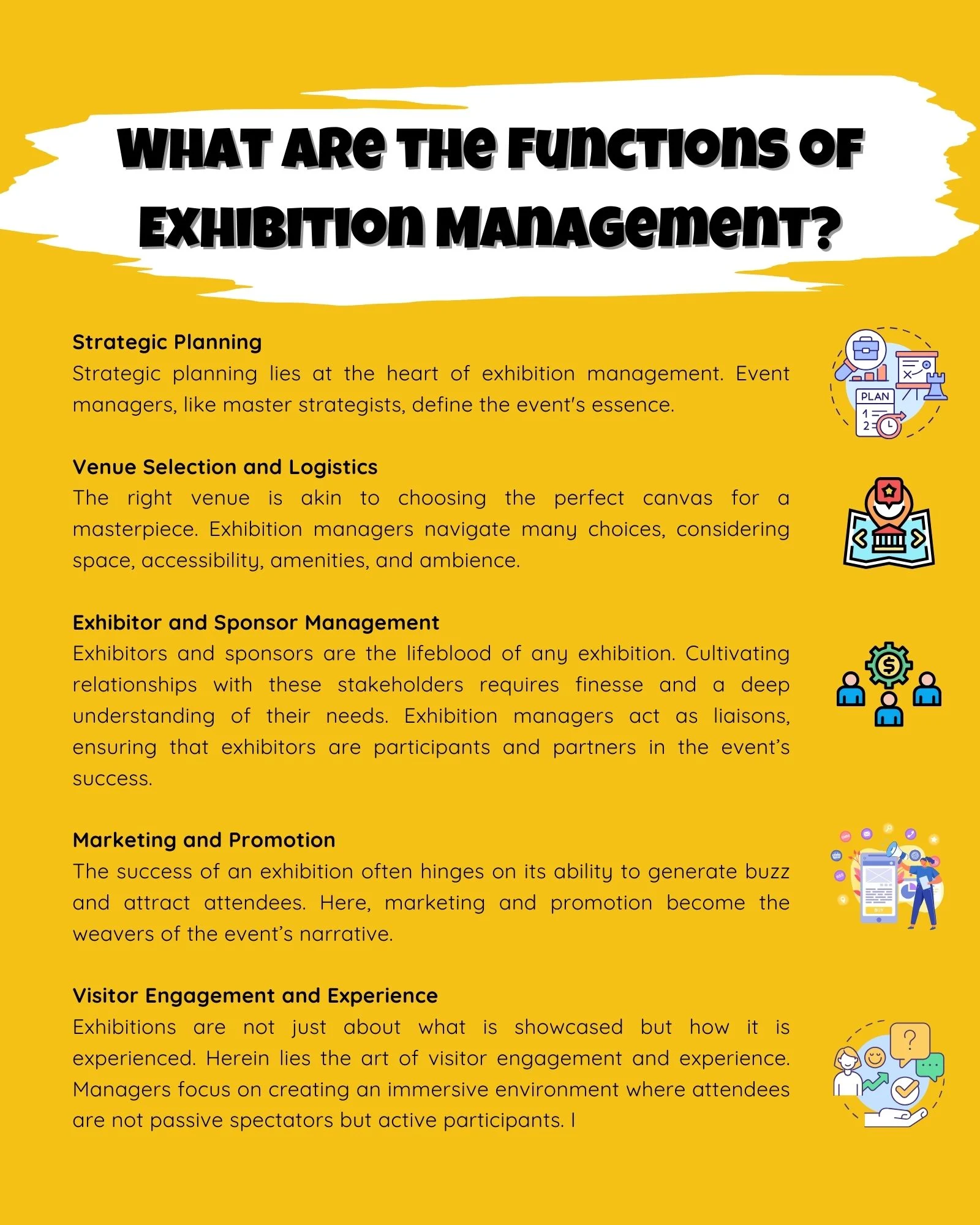
Strategic Planning
At the heart of exhibition management lies strategic planning. Event managers, akin to master strategists, define the very essence of the event. They meticulously outline objectives, whether it's enhancing brand visibility, fostering partnerships, or launching new products. This strategic blueprint becomes the guiding light, shaping venue, marketing, and participant engagement decisions. A well-defined plan aligns with organisational goals and sets the stage for the exhibition, ensuring that every element is purposeful and impactful.
Venue Selection and Logistics
The right venue is akin to choosing the perfect canvas for a masterpiece. Exhibition managers navigate many choices, considering space, accessibility, amenities, and ambience. Once the venue is selected, the logistics team springs into action. They meticulously plan booth allocations, ensuring exhibitors are positioned strategically to attract maximum footfall. Logistics extend to floor planning, equipment rental, shipping, and on-site services, creating a framework where every element seamlessly falls into place. The goal? To create an environment where attendees and exhibitors can engage without hindrance, focusing solely on the experience at hand.
Exhibitor and Sponsor Management
Exhibitors and sponsors are the lifeblood of any exhibition. Cultivating relationships with these stakeholders requires finesse and a deep understanding of their needs. Exhibition managers act as liaisons, ensuring that exhibitors are participants and partners in the event’s success. This involves managing contracts, providing detailed information, and addressing concerns promptly. Managers facilitate smooth booth setups, technical support, and overall satisfaction by understanding exhibitors' requirements. Similarly, sponsors are engaged strategically, their brand integration seamlessly woven into the fabric of the event. Exhibitions become collaborative endeavours through effective exhibitor and sponsor management, where mutual benefits abound.
Marketing and Promotion
Promoting an exhibition successfully requires a well-structured marketing strategy that targets the right audience. Social media is considered the most powerful tool for promoting exhibitions, allowing organizers to reach a wide audience quickly and effectively. This is followed by email campaigns, print invitations, and personal invitations, which offer a more targeted and personalized approach to communication. Utilizing a mix of digital and traditional channels ensures maximum outreach and enhances attendee engagement.
Visitor Engagement and Experience
Exhibitions are not just about what is showcased but how it is experienced. Herein lies the art of visitor engagement and experience. Managers focus on creating an immersive environment where attendees are not passive spectators but active participants. Informative seminars, interactive workshops, and engaging product demonstrations are curated to educate and entertain. Simultaneously, seamless registration and ticketing processes ensure that attendees can swiftly transition from the entrance to the exhibition floor. Networking opportunities are woven into the fabric of the event, encouraging spontaneous interactions and fostering relationships. The aim is to curate an experience that lingers in attendees' minds, ensuring that they leave with brochures and memories and meaningful connections.
In essence, the functions of exhibition management are threads in a grand tapestry. Each meticulously executed function contributes to creating an event that transcends expectations. The venue becomes a vibrant marketplace, logistics fade into the background as operations flow seamlessly, exhibitors and sponsors become integral partners, marketing campaigns stir anticipation, and attendees immerse themselves in an experience that captivates the senses and expands their horizons. When interwoven with precision, these functions transform exhibitions into more than events; they become immersive journeys, where innovation meets interaction and possibilities abound.
Success Metric | Description | Impact |
Attendee Engagement Level | Measure attendee interaction and participation | High engagement signifies event success. |
Lead Conversion Rate | Percentage of leads converted into clients | Indicates exhibitors’ appeal and event relevance. |
Sponsor ROI | Sponsor Return on Investment analysis | Essential for sponsor satisfaction and retention. |
Attendee Satisfaction Score | Rate attendee satisfaction with the event | High scores ensure a positive event reputation. |
Networking Effectiveness | Evaluate the quality of networking opportunities | Strong networks foster future collaborations. |
Table 1: Success metrics in exhibition management
Planning Exhibition Tips
Successful exhibition management relies on meticulous planning. Consider the following tips to ensure a well-organised and engaging event:
1. Define Clear Objectives
Every successful exhibition begins with a clear understanding of its purpose. Define your objectives distinctly. Whether it's lead generation, brand awareness, product launches, or fostering valuable networks, crystallise your goals. These objectives will serve as the guiding stars, shaping every decision you make throughout the planning process. Clear objectives direct your efforts and provide a measurable framework for evaluating the event’s success, ensuring that your efforts align with your organisational goals.
2. Know Your Target Audience
Understanding your audience is paramount. Conduct market research to grasp your target audience's demographics, interests, and preferences. This knowledge becomes the foundation upon which you tailor your exhibition. From selecting relevant exhibitors to curating engaging experiences, align every aspect of your event with your audience's preferences. By doing so, you capture their attention and create an event that resonates profoundly, fostering genuine interest and interaction.
3. Create a Detailed Plan and Timeline
A detailed plan is the backbone of any well-executed exhibition. Develop a comprehensive blueprint that includes all necessary tasks, deadlines, and responsibilities. Break down large tasks into smaller, manageable components, assigning each to the relevant team member. Ensure your realistic timeline allows ample time for each task, from designing promotional materials to coordinating with exhibitors. A meticulously planned timeline keeps your team on track, preventing last-minute rushes and ensuring that every exhibition aspect unfolds smoothly.
4. Collaborate with Exhibitors and Sponsors
Exhibitors and sponsors are not just participants; they are partners in the success of your event. Maintain open lines of communication with them. Understand their requirements, preferences, and goals. Collaborate on promotional activities, combining your strengths to maximise exposure for both parties. Engage with them early, providing necessary support and information. By fostering strong partnerships, you enhance the exhibitors’ and sponsors’ experience and create a synergistic promotional force that amplifies the event’s reach and impact.
5. Utilise Technology
In the digital age, technology is a powerful ally. Leverage event management platforms and mobile apps to streamline processes. Online registration and ticketing systems simplify attendee participation, reducing queues and enhancing the entry experience. Explore digital marketing strategies, such as targeted email campaigns and social media promotions, to reach a broader audience. In fact, studies show that the primary event marketing channel utilised by organisers is social media, with email marketing and personal invitations following closely behind in popularity. Interactive mobile apps can facilitate attendee engagement, enabling features like real-time event updates, networking opportunities, and interactive floor plans. Technology enhances efficiency and elevates the attendee experience, making your exhibition seamlessly accessible and engaging.
6. Focus on Sustainability
Incorporate sustainable practices into your exhibition planning. Embrace eco-friendly materials for booth construction and promotional items. Implement energy-efficient lighting solutions. Encourage exhibitors to minimise waste and use recyclable materials. Educate attendees about sustainable practices, fostering a sense of environmental responsibility. By embracing sustainability, your exhibition contributes to environmental conservation and demonstrates your commitment to social responsibility, garnering positive attention from attendees and stakeholders.
These planning tips are the warp and weft of a seamless exhibition experience. They represent the meticulous attention to detail, audience understanding, and technological integration necessary to create an event that transcends expectations. Adhering to these principles transforms your exhibition from a mere gathering of businesses into a dynamic, engaging, and purposeful event. It becomes a platform where ideas collide, innovations are showcased, and connections flourish – a testament to the art of exhibition management at its finest.
What Makes a Good Event Manager?
Being an effective event manager requires a unique set of qualities and skills. Here are some key attributes that contribute to being a good event manager:
Strong Organisational Skills
Event managers are the architects of seamless execution. They orchestrate every aspect of an event, juggling multiple tasks simultaneously. Exceptional organisational abilities are paramount to ensure that no detail is overlooked. From coordinating resources to scheduling and monitoring progress, event managers are the custodians of order. Their role in crafting a well-structured event cannot be overstated.
Excellent Communication and Interpersonal Skills
Effective event managers are masterful communicators. They excel in building relationships, both within their team and with external stakeholders. Clear and concise communication is their forte, ensuring that everyone involved understands their roles and responsibilities. Beyond this, they possess empathetic interpersonal skills, enabling them to work collaboratively with exhibitors, sponsors, vendors, and team members. They are adept at handling potential conflicts and addressing concerns promptly, ensuring that every voice is heard and valued.
Attention to Detail
Meticulous attention to detail is a hallmark of a successful event manager. They possess a discerning eye for every aspect of an event – from design aesthetics to logistics, scheduling, and budgeting. They ensure that nothing is overlooked or goes amiss, guaranteeing that the event unfolds without hitches. In the intricate world of event management, the devil is in the details, and an exceptional manager ensures that every detail is attended to with precision.
Flexibility and Adaptability
Exhibitions and events are dynamic by nature, often presenting unforeseen challenges and changes. Good event managers are masters of adaptability. They can swiftly adjust to unexpected situations, make on-the-spot decisions, and find creative solutions to challenges as they arise. Their ability to remain calm under pressure and think critically ensures that the event can pivot and adapt to evolving circumstances, even in the face of adversity.
Problem-solving Skills
Event managers must be proactive problem solvers. They can identify issues before they escalate into larger problems and resolve them efficiently. By anticipating potential challenges and developing contingency plans, they ensure that the event runs smoothly. Even when unexpected issues arise, they remain poised and level-headed, thinking critically to find solutions that minimise disruption and maintain the event's success.
In short, being a good event manager is more than just overseeing logistics; it's about possessing a unique blend of skills and qualities. It's about meticulously organising every facet of an event, building bridges between stakeholders, paying attention to even the smallest details, adapting to the unexpected, and proactively solving problems. Exceptional event managers are the unsung heroes behind the scenes, ensuring that exhibitions and events run flawlessly and leave a lasting impression on attendees and stakeholders. Their ability to combine these qualities and skills is what distinguishes a good event manager from a great one.
The Future of Virtual Exhibitions
As the world evolves in the digital age, so too does the landscape of exhibitions. One of the most exciting and transformative developments is the emergence of virtual exhibitions. These digital realms are redefining the way we connect, engage, and experience events. In fact, 81% of event managers have embraced virtual events in 2022, according to Sweap. That being said, let's explore the captivating realm of virtual exhibitions and their potential impact on the future of event management:
The Rise of Virtual Reality (VR) and Augmented Reality (AR)
Virtual exhibitions fully exploit emerging technologies, particularly virtual reality (VR) and augmented reality (AR). VR immerses attendees in a digital world where they can explore exhibition booths, view products, and engage in a lifelike environment. AR, conversely, enhances the real world by overlaying digital information and objects onto physical spaces, enabling attendees to interact with the virtual and physical simultaneously.
These technologies offer a level of immersion and interactivity that goes beyond what physical exhibitions can achieve. Attendees can walk through a virtual showroom, interact with products, and even attend live presentations or demonstrations from their homes. This flexibility and interactivity make virtual exhibitions a promising frontier in the event management industry.
Global Accessibility and Inclusivity
One of the most significant advantages of virtual exhibitions is their global accessibility. Traditional physical events are often limited by geographical constraints, making participating challenging for international attendees. Virtual exhibitions, however, break down these barriers. Attendees worldwide can access and engage with the event, expanding the reach and impact of the exhibition.
Moreover, virtual exhibitions enhance inclusivity. People with disabilities or limitations that hinder their ability to attend physical events can now participate fully in virtual exhibitions. The digital environment offers features like customisable interfaces, assistive technologies, and accommodations that ensure a more inclusive and accessible experience for all attendees.
Reduced Environmental Impact
Virtual exhibitions present a compelling advantage in an era marked by a growing focus on environmental sustainability. Physical exhibitions often involve extensive resource consumption, including travel, energy, and material use. Virtual exhibitions, on the other hand, significantly reduce the carbon footprint associated with events.
By eliminating the need for physical travel and reducing the demand for physical infrastructure, virtual exhibitions contribute to a more sustainable and environmentally friendly approach to event management. This aligns with the increasing awareness of the need for eco-conscious practices, making virtual exhibitions a key player in the industry's sustainability efforts.
Enhanced Analytics and Data Collection
Virtual exhibitions offer unparalleled opportunities for data collection and analytics. Every interaction within the digital environment can be tracked and analysed, giving organisers a wealth of information about attendee behaviour, interests, and engagement levels. This data can be used to refine future exhibitions, customise content, and optimise the attendee experience.
Real-time analytics enable event managers to make data-driven decisions, such as adjusting the event in response to attendee preferences, optimising booth layouts, or fine-tuning marketing strategies. The depth and precision of data collection in virtual exhibitions empower event managers with invaluable insights that can shape the direction of future events.
Advantage | Description |
Global Accessibility | Reach attendees worldwide without travel limitations. |
Real-time Data Analytics | Collect and analyse attendees’ interactions instantly. |
Environmental Sustainability | Minimise carbon footprint and resurce consumption |
Enhances interactivity and Engagement | Facilitate immersive experiences for attendees |
Cost-effectiveness | Lower operational costs compared to physical events |
Table 2: Advantages of virtual exhibitions
The Fusion of Physical and Virtual
While virtual exhibitions offer remarkable benefits, the future of events may not be an either-or scenario. In fact, a hybrid approach that combines physical and virtual elements is gaining traction. Hybrid events allow for a broader reach, as attendees can choose to participate physically or virtually. This integration extends the benefits of virtual exhibitions to physical events and vice versa, creating a dynamic and engaging event landscape.
Hybrid events enable organisers to capture a broader audience, engage international participants, and offer attendees the flexibility to choose their preferred mode of participation. As the technology and infrastructure for hybrid events continue to develop, this fusion of physical and virtual elements is poised to reshape the event management industry.
In summary, the future of virtual exhibitions is a frontier of limitless possibilities. Emerging technologies like VR and AR redefine the attendee experience, making events more immersive and engaging. Global accessibility, reduced environmental impact, enhanced data collection, and the fusion of physical and virtual elements all contribute to the evolving landscape of event management. As the industry continues to embrace these digital innovations, virtual exhibitions are poised to transform how we connect, learn, and interact in the digital age.
Conclusion
Exhibition management plays a vital role in the success of events, enabling businesses and organisations to showcase their offerings, foster connections, and achieve their objectives. Effective exhibition management involves strategic planning, meticulous coordination, and seamless execution. By implementing the provided tips and embodying the qualities of a good event manager, professionals can create memorable and impactful exhibitions that leave a lasting impression on attendees and contribute to organisational growth. However, if you need help learning more about exhibition management principles, risk assessment, operational running, and more, contact us today, or check out our course ‘Exhibition Management’.
Dive deep into the art and science of organising exhibitions, guided by industry experts and enriched with hands-on experiences. Discover the secrets behind successful exhibitions, learn to harness cutting-edge technologies, and master the art of creating unforgettable experiences. Enrol now and be the architect of tomorrow's exhibitions!









